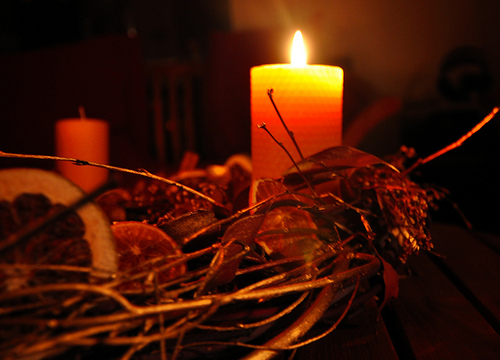
Last Sunday was “Christ the King” for those churches guided by the liturgical year. This Sunday we begin a new year with the First Sunday of Advent. Advent is not Christmas — that is the celebration that Christ has come. Advent is about getting ready for his coming.
Now, before Advent begins, is a great time to think ahead:
“How can I make Advent a time of spiritual growth? How can I make good use of four weeks anticipating the coming of the Savior?”
I highly recommend taking special time for prayer. (If you are looking for some guidance and resources to renew your prayer life, try my book, Kneeling with Giants. Check out my new “In the Media” page for the low down.)
My own Advent preparations will include meditations on the parts of the Heidelberg Catechism on the coming of Christ. (I’ve been blogging on this widely used and well-loved summary of Christian teaching all year in honor of its 450th anniversary.)
Some of the most relevant questions are in the Catechism’s line-by-line explanation of the Apostles’ Creed. After explaining “Jesus,” “Christ,” and “our Lord,”, the Catechism asks,
33 Q. Why is he called God’s “only begotten Son” when we also are God’s children?
I file this under “Good questions Christians forget to ask.”
Christians often say that God is everybody’s Father; that every person everywhere is a child of God.
It is surely true that we are all created in God’s image. God does pour out love and care on us all. However, I fear that our assumption of the universal Fatherhood of God comes more from the classical Liberalism of the 19th century than from Scripture or Reformed theology.
Liberalism is often characterized as boiling Christianity down (via Adolf von Harnack) to
“the fatherhood of God and the brotherhood of man.”
The Catechism’s answer to the question draws attention to a biblical distinction between God’s two kinds of children. Here’s the first part of its answer:
A. Because Christ alone is the eternal, natural Son of God.
Here, then, is the wonder of the Christmas that lies ahead. We wait for more than an innocent baby in a manger. The “eternal” Son of God is born among us as Jesus, the “natural” Son of God.
In other words, the second Person of the Trinity has been born among us.
Then comes the second part of the answer, about God’s other kind of children:
We, however, are adopted children of God— adopted by grace through Christ.
This is the unsung wonder of salvation, the answer to the unasked question: this eternal Son of God has invited us into his family. We are adopted, able to call Christ our brother and call the First Person of the Trinity “Our Father.”
Back in the early centuries of Christianity people didn’t get to pray the Lord’s Prayer and call God their Father until they were baptized. That is when you knew you were adopted.
So, my friends ponder this very good news as Advent begins: in Christ you are no longer simply a well-blessed part of God’s good creation. Now you are adopted as God’s own beloved child. You are a member of the family.
What will your Advent preparations look like this year?
————
If you liked the post I hope you’ll share it! You can use the social media buttons below.
If we are not yet connected on Facebook, I hope you’ll “like” my page. You can use the button in the right hand column.

Gary, I ready your posts, regularly but rarely comment. But thanks for shedding light here. Especially on a day that seems dedicated solely to buying gifts (for ourseives more than others?), great to redirect us to GOD’S gifts to us. Tassie
Thanks Tassie! Give my love to the gang.
Gary: Thank you for writing clearly and plainly, “Advent is about getting ready for his coming.” I have sometimes tried to point out to people the preparatory nature of advent only to have them argue with me. At the same time, I am fascinated with your appeal to the Heidelberg Catechism. Would the authors of the catechism have observed advent? Moreover, would they have thought that it was even possible to prepare for the coming of the Christ? In light of question and answer 8, I would think not.
Thanks for commenting Dr. Goodloe —
I’m not really appealing to the Heidelberg Catechism here; certainly not for support in encouraging Christians to observe the season of Advent. Those early Reformed folks tended to jettison most of the liturgical year. (Calvin did break from his lectio continua preaching the week of Christmas and the week of Easter, but that was pretty much it.)
I’m just doing my own Advent reflections based on what the Catechism says about the Christ whose coming we await.
As to question 8, I think one has to distinguish between “preparing as a non-Christian” (like doing something to make ourselves better able to receive Christ in the first place) and “preparing as a Christian” (like once you have faith, doing something in December each year to be better poised to celebrate with all Christians the fact that Christ has come).
The answer to the former would be “no”, since the initiative is always God’s — though once God’s Spirit is secretly at work, many who are on the road to faith feel like they are doing the “preparing.”
The answer to the latter would have to be “yes.” The Puritans are great role models of Reformed Christians who took an active part in preparing themselves in advance for Sunday worship. And so I take action in Advent to prepare myself for the Church’s celebration — though of course in a hidden way God still takes the initiative even in this.
But one thing is needful: and Mary hath chosen that good part, which shall not be taken away from her.
Thanks for commenting Christina — want to say more?